
The Council of Asian Liberals and Democrats (CALD), a regional network of liberal and democratic political parties in Asia, is expressing grave concern on the deteriorating state of democracy and rule of law in Indonesia.
This worrying development has commenced when then President Joko “Jokowi” Widodo, constrained by term limits, attempted to change the constitution so he could run again. The move was strongly opposed by his own political party, the Indonesian Democratic Party of Struggle (PDI-P), but this did not stop Jokowi from using the powers and influence of the presidency for personal ends. The abuse of power and authority has been most blatant and glaring in the events leading to, and in the immediate aftermath of, the 2024 presidential and regional elections:
- In October 2023, Indonesia’s Constitutional Court made an exception to the minimum age requirement to run for president and vice-president by ruling that those under 40 years old could run provided they have previously been elected to regional office. The decision was widely seen as an accommodation of Jokowi’ son, Gibran Rakabuming Raka, who was 36 at that time, to run as vice president in the 2024 election. The chief justice of the Constitutional Court, a brother-in-law of Jokowi, was subsequently sacked from his position, but the ruling remains in force. This paved the way for the election of Gibran as vice president of Prabowo Subianto in the February 2024 elections.
- In June 2024, Indonesia’s Supreme Court changed the interpretation of the Election Commission regulation on the age requirement for regional head candidates. Originally, the age requirement was at least “30 years old for governor and deputy governor candidates and 25 years old for regent and deputy regent or mayor and deputy mayor candidates, starting from the inauguration of the elected candidate pair.” The Supreme Court, however, interpreted the age requirement as “since their inauguration” as elected regional heads. This move was seen as tailor-made to allow Jokowi’s youngest son, Kaesang Pangarep, who would only turn 30 in 25 December this year, to run in the November 2024 regional elections. The Constitutional Court rejected the Supreme Court interpretation in August 2024, leading to Jokowi’s allies in the national legislature’s attempts to change the election law to still allow Kaesang to run. The move sparked massive protests in Jakarta and other provinces, forcing the legislature to abandon its plans.
- In both February 2024 general election and November 2024 regional election, there appears to be a rampant abuse of state personnel and resources to favor the candidates backed by the incumbent administration. In the report of Asian Network for Free Elections (ANFREL), for example, the systematic and structured use of social assistance (bansos) by the Jokowi administration was cited as an example of abuse of state resources in election. It noted, in particular, the nature of the bansos program: (1) their distribution during the campaign period in closely contested areas, prompting suspicions of funds being utilized similarly to a pork barrel scheme; (2) the president personally handing out assistance, in contrast to other schemes where funds are transferred to beneficiaries’ bank accounts; (3) despite being politically charged and targeted, bansos, as a program, lacks specificity and appears random, lacking clear data to justify its distribution to specific areas. Apart from the use of bansos, the incumbent government also seemed to politicize the police forces and the government bureaucracy to favor administration-backed candidates in the general and regional elections, even resorting to intimidation and coercion. Such abuse of state resources and personnel has been documented in places such as Central Java, Banten, South Sulawesi, West Sumatra, among others.
CALD is alarmed that these moves to circumvent the law to benefit the personal interests of the few seriously compromise the hard-won democratic rights of the Indonesian people. Indonesia has made significant strides in strengthening its democratic institutions and processes since the fall of Suharto, but these actions by the Jokowi and Prabowo administrations in recent general and regional elections erode the fundamental principles of democracy, violates the rule of law, compromises fair electoral competition, and prevents the genuine expression of the Indonesian people’s will.
In light of these attacks to democracy and the rule of law in Indonesia, the Council:
|

 Unit 409, 4/F La Fuerza Plaza 2, 2241 Don Chino Roces Ave. corner Sabio St., 1231 Makati City, Philippines
Unit 409, 4/F La Fuerza Plaza 2, 2241 Don Chino Roces Ave. corner Sabio St., 1231 Makati City, Philippines
 +632 8819 60 71
+632 8819 60 71
 info@cald.org
info@cald.org